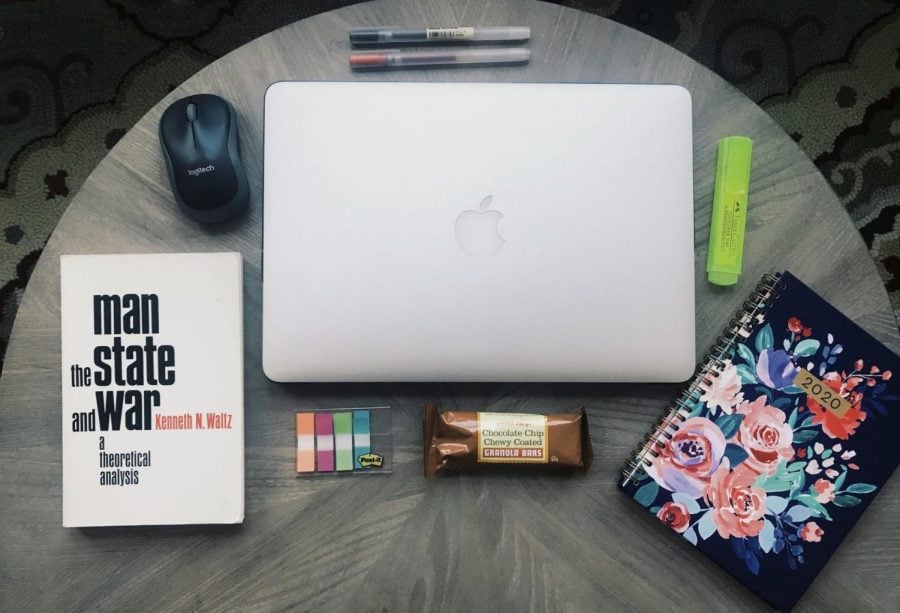8 tips for thriving in a remote learning environment
Without a doubt, these past couple of weeks have been a blur. Whether you spent your remaining time nervously wrapping up finals, saying goodbye to friends or moving out and flying back home, time surely flew by faster than we all hoped as school is back in session again. Since the global pandemic brought numerous changes, getting used to our new types of “normal” can be intimidating. Along with this new “normal” is the sudden transition to remote learning to limit outside contact. As we all peruse through such a unique and challenging time, here’s some advice.
Fine-tune your work from home plan.
Old habits of studying like pulling all-nighters in the library are not apt anymore.
Freshman Liam Guiritan promotes the pomodoro method.
“You do work for 25 minutes, rest for five minutes and repeat,” Guiritan said. “On the fourth cycle, instead of taking a five-minute break, take a 15-minute one.”
Stay organized.
Emily Hoey, counseling graduate student and student success coach, advocates for systems like Google Calendar and writing everything down.
“It makes it so much easier to delegate or reschedule,” Hoey said. “When I’m staying on top of my calendars and being honest with myself about what I can do and what I really want to do, I’m able to enforce healthy boundaries with myself and others.”
Isabel Tuazon, a senior, invests in a physical planner to jot down all due assignments and quizzes to stay ahead of her schedule.
Unplug from your devices.
Linette Sanchez, a sophomore, noticed that remote learning gives her more reasons to rationalize her phone usage, so she came up with a tactic.
“What I have been doing is placing my phone on the couch away from me and that has generally worked,” Sanchez said.
Refraining ourselves from using technology doesn’t only improve our productivity. It also contributes to our holistic wellness.
Katrina Wagner, DePaul’s health promotion coordinator, conceptualized that a good strategy can look like intentionally being tech-free before bedtime.
“Creating a nightly routine free from technology can help increase our melatonin production,” Wagner said. “This helps our circadian rhythms and signals to our bodies that it is bedtime.”
Establish a routine and stick to it.
Guiritan said that if you don’t have one yet, now is a great time to make one.
“By following a morning routine, you are preparing your body and mind to be productive,” Guiritan said.
Sanchez said practicing consistency will eventually come in handy.
“If one develops good habits now in the beginning of remote learning, then ending finals on a strong note will not be as hard,” Sanchez said.
Have a dedicated workspace.
If given the capacity, Wagner recommends to “set a physical boundary” that separates academics from your home.This might mean setting shop on the kitchen countertop or the bedroom floor.
Mya Whitton, a sophomore, said that folks dealing with smaller-sized spaces might have to rearrange their belongings.
“I’ve been getting rid of clutter and placing distracting features outside of my room,” Whitton said.
Reach out to resources.
Aside from communicating needs to professors, Wagner suggests for all students to look into what DePaul has to offer, especially for students who find the transition challenging.
Even during the lockdown, DePaul’s Office of Health Promotion and Wellness is still open for business through remote platforms.
“Our peer educator students, the Health Education Action Team will still be offering virtual programs and workshops,” Wagner said. This effort aims to “support students with their well-being and help them navigate the quarter as usual.”
Aside from HPW’s DeHub and social media accounts, the office also started a weekly blog that highlights a new wellness topic available for students, faculty and staff.
Make time for yourself.
Tuazon said that now is the time to attend to hobbies we never had time for before.
“Try to incorporate as much fun as you can into your schedule to stay busy yet happy,” Tuazon said.
Whitton rewards herself with breaks.
“I motivate myself by listening to music and talking to family members on the phone,” Whitton said.
Maintain and create connections.
Hoey said that using channels like Zoom gives her the ability to connect with both students and campus partners to work toward holistic success.
“Community is so important and it does not need to disappear in these trying times,” Hoey said. “I also encourage students to drop into virtual spaces such as those hosted by Mission and Ministry, HPW, Office of Student Involvement and our own drop-in coaching room.”







